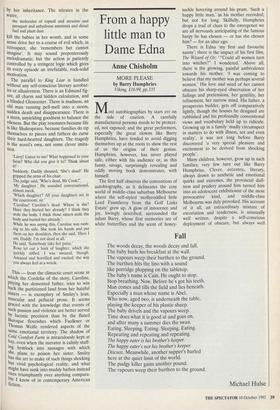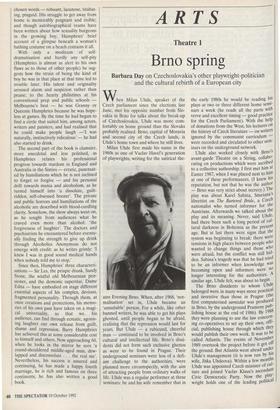From a happy little man to Dame Edna
Anne Chisholm
MORE PLEASE by Barry Humphries Viking, £16.99, pp.335 Most autobiographies by stars err on the side of caution. A carefully manufactured persona needs to be protect- ed, not exposed; and the great performers, especially the great clowns like Barry Humphries, have tended to avoid digging themselves up at the roots to show the rest of us the origins of their genius. Humphries, however, has never played safe, either with his audience or, as this funny, savage, surprisingly revealing and oddly moving book demonstrates, with himself.
The first half observes the conventions of autobiography, as it delineates the cosy world of middle-class suburban Melbourne where the self-styled 'mollycoddled little Lord Fauntleroy from the Golf Links Estate' grew up. A glow of innocence and joy, lovingly described, surrounded the infant Barry, whose first memories are of white butterflies and the scent of honey-
suckle hovering around his pram. 'Such a happy little man,' as his mother recorded; but not for long. Skilfully, Humphries drops a trail of clues to the emergence we are all nervously anticipating of the famous harpy he has chosen — or has she chosen him? — for an alter ego.
There is Edna 'my first and favourite nanny'; there is the impact of his first film, The Wizard of Oz: ' "Could all women turn into witches?" I wondered.' Above all, there is the growing, painful ambivalence towards his mother. 'I was coming to believe that my mother was perhaps several women.' His love and need of her cannot obscure his sharp-eyed observation of her failings and pretensions, her gentility, her refinement, her narrow mind. His father, a prosperous builder, gets off comparatively lightly, though the houses he designed are rubbished and his profoundly conventional views and vocabulary held up to ridicule. Growing up in a family 'madly circumspect in matters to do with illness, sex and even reality', it was not long before Barry discovered 'a very special pleasure and excitement to be derived from shocking people'.
Many children, however, grow up in such families; very few turn out like Barry Humphries. Clever, eccentric, literary, always drawn to aesthetic and emotional quirks and extremes, the provincial dull- ness and prudery around him turned him into an adolescent exhibitionist of the most provocative kind, and middle-class Melbourne was duly provoked. His account of it all, an extraordinary mixture of excoriation and tenderness, is unusually well written, despite a self-conscious deployment of obscure, but always well chosen words — reboant, lacunose, titubat- ing, pinguid. His struggle to get away from home is memorably poignant and risible; and though autobiographical reams have been written about how sexuality burgeons in the growing boy, Humphries' brief account of a glimpse beneath a woman's bathing costume on a beach contains it all.
With only a modicum of self- dramatisation and hardly any self-pity (Humphries is almost as alert to his own flaws as to those of other people) he sug- gests how the strain of being the kind of boy he was in that place at that time led to trouble later. His talent and originality aroused alarm and suspicion rather than praise: to the hearty philistines at his conventional prep and public schools Melbourne's best — he was Granny or Queenie Humphries because he was hope- less at games. By the time he had begun to find a circle that suited him, among actors, writers and painters, and had realised that he could make people laugh —I was naturally, instinctively ridiculous' — he had also started to drink.
The second part of the book is clumsier, more anecdotal and less polished, as Humphries relates his professional progress towards stardom in England and Australia in the Sixties — erratic, punctuat- ed by humiliations which he is not inclined to forget or forgive — and his personal drift towards mania and alcoholism, as he turned himself into 'a dissolute, guilt- ridden, self-obsessed boozer'. The private and public horrors and humiliations of the alcoholic are described with blood-curdling clarity. Somehow, the show always went on, as he sought from audiences what he craved even more than alcohol: 'the forgiveness of laughter'. The doctors and psychiatrists he encountered before eventu- ally finding the strength to give up drink through Alcoholics Anonymous do not emerge with credit: as he writes grimly: 'I knew I was in good sound medical hands when nobody told me to stop.'
Since then, Humphries' three characteri- sations — Sir Les, the priapic drunk, Sandy Stone, the wistful old Melbournian pen- sioner, and the demonic superstar, Dame Edna — have embodied on stage different essential aspects of his complex, devious, fragmented personality. Through them, at once creations and protections, his memo- ries of his own past have taken on a magi- cal universality, so that we, his audience, can find through ecstatic, agonis- ing laughter our own release from guilt, shame and repression. Barry Humphries has achieved this at some considerable cost to himself and others. Now approaching 60, when he looks in the mirror he sees 'a round-shouldered middle-aged man, dew- lapped and disconsolate . . . the real me'. Nevertheless, his success is assured and continuing, he has made a happy fourth marriage, he is rich and famous on three continents; he has also written a good book.



























































 Previous page
Previous page